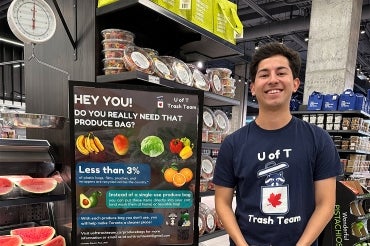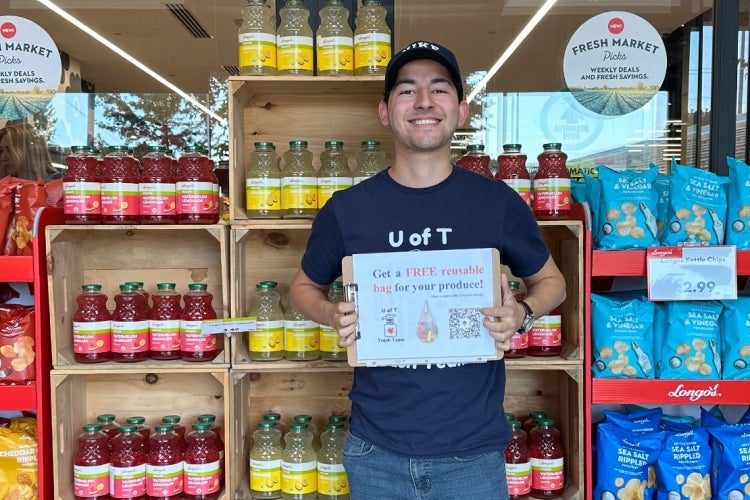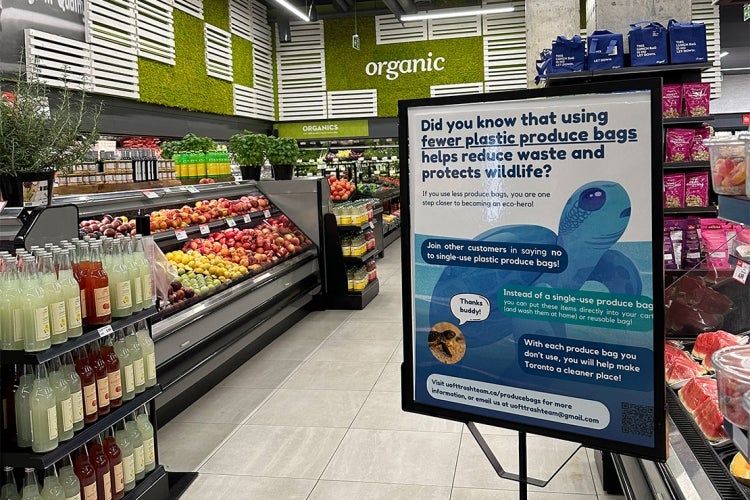U of T Trash Team partners with grocery chain to reduce single-use plastic produce bags

Through a partnership with grocery chain Longo’s, Diego Arreola Fernández and the U of T Trash Team ran a pilot project in two stores to collect data on plastic produce bags and test strategies to reduce their use (image courtesy of Diego Arreola Fernández)
Published: July 8, 2025
Faculty of Arts & Science
Diego Arreola Fernández, an international student from Mexico who will graduate from the University of Toronto this fall, recalls being surprised to find single-use plastic produce bags during his initial trips to the grocery store in Canada.
Originally from Mexico City – where such bags have largely been phased out – Arreola Fernández was struck by their continued presence in everyday shopping in Canada, even as many grocery chains have eliminated single-use plastic shopping bags at checkouts.
“It was strange coming to Toronto, where there’s a lot of action and progressive policies in many other environmental areas, but not in this,” says Arreola Fernández, a sustainability activist who is pursuing a degree in international relations and economics at U of T as a member of St. Michael’s College. “To me, it was something that we could really focus on, tackle and hopefully soon get out of stores.”
That realization inspired a U of T pilot project – and a collaboration with grocery chain Longo’s – called Garbage-less Groceries, aimed at reducing the use of plastic produce bags.
The project began in 2024 when Arreola Fernández pitched the idea to the U of T Trash Team, a science-based community outreach organization made up of undergraduate and graduate students, postdocs, researchers, local volunteers and staff. The team was founded in 2017 in collaboration with the lab of Chelsea Rochman, an associate professor in the department of ecology and evolutionary biology in the Faculty of Arts & Science.
The project launched shortly afterward, with Arreola Fernández serving as U of T Trash Team’s pollution prevention project fellow.
“The fellowship has been a phenomenal opportunity because it was open to any environmental topic I wanted to focus on,” Arreola Fernández says.

Key to Garbage-less Groceries’s success was finding a partner willing to let Arreola Fernández and the U of T Trash Team into its stores. He reached out to supermarkets – and Longo’s jumped at the opportunity.
“Longo’s is already doing a lot in different areas of sustainability, like reducing waste, recycling and retrofitting their stores,” Arreola Fernández says. “It made sense they were genuinely passionate about this project.”
Longo’s agreed to run pilot projects in two stores – York Mills and Liberty Village – to collect data on plastic produce bag usage and implement targeted interventions.
“Reducing plastic waste is one of the most challenging sustainability issues we face as a grocery retailer, so we really welcomed any opportunities to explore innovative ways to decrease plastic waste,” says Sara Olivieri, a sustainability specialist at Longo’s.

The team found that an average of 2,000 plastic produce bags are used per day in a single Toronto grocery store – a number that scales up quickly in an urban region of seven million people.
Making matters worse, data shows that only about three per cent of those bags are recycled in Canada.
“The big majority go into landfills or the environment,” Arreola Fernández says.
To shift consumer behaviour, Arreola Fernández and Longo’s introduced signage about the environmental impact of plastic produce bags, promoted the use of reusable bags and reduced the number of plastic bag dispensers in the stores running the pilot.
It worked. The team saw a significant uptick in reusable produce bag sales when they were placed atop the plastic dispensers and paired with signage encouraging their use.
“A lot of people took them or saw us in the store and asked us about them, which was nice,” Arreola Fernández says. “I would say that was one of the biggest surprises.”
But the most impactful intervention was reducing the number of produce bag stands, particularly near items such as bananas that don’t really require a bag.
The project was a success for both the U of T Trash Team and Longo’s, which plans to continue with some of the interventions Arreola Fernández helped implement.
“There is this thought that corporations or businesses might not always be the best allies for environmental, conservation or sustainability issues,” Arreola Fernández says. “This project assured me there's amazing partners and people everywhere, regardless of the type of work we do.”
While Arreola Fernández’s U of T Trash Team fellowship has concluded, he remains active in sustainability advocacy. He recently attended a United Nations climate change conference in Germany and continues to raise awareness – and push for meaningful action – on plastic pollution.
“We need more effort in all types of single use plastics to stop them at the source and find better alternatives,” Arreola Fernández says.
Meanwhile, the partnership between U of T Trash Team and Longo’s continues. To mark Earth Day in April, the partners participated in a cleanup at Sir Casimir Gzowski Park Beach. The teams focused on collecting pre-production plastic pellets that had washed ashore from upstream industrial sources.
“Because of that ongoing collaboration, Longo’s was keen to continue to work with us, and we were keen to do a cleanup that was a little more unique,” says Rochman, who is a global leader in studying the threat of plastic pollution.
In addition to learning about this lesser-known source of plastic pollution, Longo’s staff removed 1,725 plastic pellets.
“The cleanup allows people to see the plastic problem in a different way, looking at microplastics versus straws, stir sticks and bags,” Rochman says.



